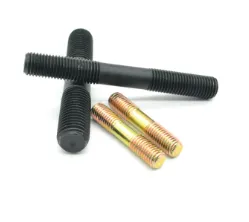Carbon Steel Hex Bolts: A Solid Pillar in the Industrial Fastener Industry
Aug . 13, 2025 11:32 Zréck op d'Lëscht
Carbon Steel Hex Bolts: A Solid Pillar in the Industrial Fastener Industry
Among the numerous fastening components in industrial production, Carbon Steel Hex Bolts, with their classic structure, reliable performance, and wide applicability, have become indispensable basic components in various machinery, equipment, and structural connections, providing solid guarantees for stable operation in the industrial field.

Carbon Steel Hex Bolts have a simple and practical construction
Hex bolts are mainly composed of a head and a screw, with the head being a regular hexagon. This shape design not only facilitates installation and disassembly using tools such as wrenches, but also provides uniform force points during fastening, ensuring the stability of the connection. The surface of the screw part is machined with uniform threads, and the accuracy and pitch of the threads depend on different usage requirements, which can perfectly match the nut and achieve a firm connection. Although the overall structure is simple, it has been carefully designed to balance practicality and reliability.
Carbon steel material endows Carbon Steel Hex Bolts with excellent performance
Carbon steel itself has high strength and toughness. After appropriate heat treatment processes, the mechanical properties of bolts are further improved, and they can withstand large loads and tensile forces, meeting the fastening requirements in different industrial scenarios. At the same time, carbon steel materials have a wide range of sources and relatively low production costs, making Black Coating hex bolts have a certain price advantage and suitable for large-scale industrial applications. In addition, its surface can be treated with galvanizing, blackening and other methods to enhance rust prevention ability and extend its service life.
Carbon Steel Hex Bolts have a wide range of applications in the industrial field
In mechanical manufacturing, black oxidation hex bolts are widely used for connecting components of machine tools, construction machinery, and other equipment to ensure stable fit between each component; In the construction industry, it is used for fixing steel structures, pipelines, etc., bearing the weight and external forces of building structures; In automobile manufacturing, from the body to the engine, many parts rely on its fastening function to ensure the safety and stability of the car during driving; It also plays an important fastening role in fields such as power equipment and chemical machinery.
With the continuous development of industrial technology, the technology of Carbon Steel Hex Bolts is also constantly advancing
The precision control of bolts is stricter, and the machining accuracy and consistency of threads are significantly improved, making the connection more tight and reliable. In terms of materials, by optimizing the composition ratio of carbon steel, specialized carbon steel materials with high strength and toughness have been developed to further improve the performance of bolts. At the same time, the continuous improvement of production processes and the application of automated production lines have increased production efficiency and product quality stability, meeting the growing industrial demand.
In summary, galvanized hex bolts occupy an important position in the field of industrial fastening due to their simple and practical construction, excellent material properties, wide application range, and continuous technological progress. Although it may seem ordinary, it silently plays a crucial role in countless industrial scenarios, ensuring the stable operation of various equipment and structures. With the continuous development of industry, Carbon Steel Hex Bolts will continue to innovate in materials, processes, and other aspects, providing more reliable fastening solutions for the industrial field.
Carbon Steel Hex Bolts FAQs
What are the material characteristics of Carbon Steel Hex Bolts?
Carbon Steel Hex Bolts are mainly made of carbon steel (such as Q235, 45 # steel, or ASTM A307), which has high strength and hardness, low cost, but weak rust resistance. Surface treatment (such as galvanizing, blackening) is usually required to improve corrosion resistance.
How to distinguish between Carbon Steel Hex Bolts of different strength levels?
Distinguish by bolt head markings or standard numbers, for example:
4.8 level: ordinary strength, unmarked or marked with "4.8".
8.8 level: High strength, with the header labeled "8.8", commonly used in heavy-duty scenarios.
ASTM A307: American standard Carbon Steel Hex Bolts, divided into Grade A (ordinary) and Grade B (high strength).
In which scenarios are Carbon Steel Hex Bolts commonly used?
Suitable for general structural connections, mechanical assembly, construction and other fields, such as steel structure frames, pipeline flanges, equipment bases, etc. Not recommended for use in highly corrosive environments (such as seaside) or extreme temperature conditions.
What issues should be noted when installing Carbon Steel Hex Bolts?
Ensure that the strength grade of bolts and nuts matches.
Use a torque wrench when tightening to avoid slipping or breaking due to over tightening.
If anti loosening is required, gaskets can be added or thread glue can be applied.
How to choose between Carbon Steel Hex Bolts and stainless steel bolts?
Carbon Steel Hex Bolts: Low cost, high strength, but require surface rust prevention treatment, suitable for budget limited or non corrosive environments.
Stainless steel bolts: Strong corrosion resistance (such as 304/316), but high price and slightly lower strength, suitable for humid or chemical environments.
Neist Neiegkeeten
-
Bolts for Lawn Mower Handle Supplier | OEM & Rust-Resistant
NeiegkeetenNov.17,2025
-
Silver Screws Supplier | Corrosion-Resistant, Bulk & Custom
NeiegkeetenNov.17,2025
-
Cabinet Bolts Supplier | OEM, Bulk Stock, Fast Shipping
NeiegkeetenNov.17,2025
-
Axle Nuts Supplier - OEM-Grade, ISO-Certified, Fast Delivery
NeiegkeetenNov.17,2025
-
Wire Bolts Suppliers – OEM Factory Prices, ISO Quality
NeiegkeetenNov.11,2025
-
Bolts for Lawn Mower Handle Supplier – OEM & Anti‑Rust
NeiegkeetenNov.11,2025
